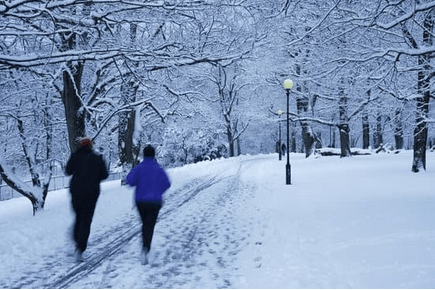"Frosty Inspiration: 14 Ways to Stay Motivated This Winter"

As the days grow shorter and the temperature drops, staying motivated can feel like an uphill battle. You're not alone if you notice your energy dipping as winter wraps its chilly fingers around us.
Many people experience a slump in drive during these colder months, leading to a phenomenon often dubbed the "winter blues." With years of experience exploring motivation techniques and wellness strategies, I've discovered powerful ways to help runners and walkers maintain their momentum regardless of the weather.
Winter's bite doesn't have to mean a freeze on your motivation. Research suggests that regular exposure to light and maintaining physical activity play pivotal roles in uplifting our spirits and keeping us energized.
In this article, we'll dive into 14 proven strategies that can transform your winter from dreary to dynamic. Get ready for insights that will thaw out your drive and propel you forward!
Key Takeaways
- Light helps stay motivated in winter. Use bright lights inside and try to get sunlight.
- Dress warm when it's cold outside so you can still exercise and feel good.
- Do things you like such as running with friends or trying new trails to keep up your energy.
- Regular exercise helps avoid gaining weight and feeling sad. It can be indoors or a quick walk outside.
- If you need help, talk to a doctor or join a group that knows about winter blues.
Understanding Winter Motivation

During winter, many people experience a decrease in motivation due to factors such as less sunlight and colder temperatures. This can have a profound impact on our mental health, leading to feelings of low energy and reduced productivity.
Why do we feel less motivated during winter?
 Cold weather and less daylight in winter can make us want to stay inside and rest. This can lead to feeling less eager to do things, including exercising or going for a walk. Our bodies react to the cold by trying to save energy.
Cold weather and less daylight in winter can make us want to stay inside and rest. This can lead to feeling less eager to do things, including exercising or going for a walk. Our bodies react to the cold by trying to save energy.
We may feel like we want extra sleep or just sit on the couch because it's cozy.
Less sunlight can also affect how we feel. The light helps our brains stay alert and happy. In winter, when there is not much sun, our brains might get sad or foggy. For some people, this is called Seasonal Affective Disorder (SAD).
Runners and walkers must find ways to deal with these changes in winter. You need good plans so you keep moving even when it's hard. Think about what you love doing that makes you move, like running in a new place or walking with friends.
How can it affect our mental health?

The winter season can have a significant impact on our mental health. The decrease in sunlight and cold weather can lead to feelings of low energy, irritability, and even depression.
Seasonal Affective Disorder (SAD) is a type of depression that occurs at the same time every year, usually in the winter months when daylight hours are shorter. Lack of exposure to natural light can disrupt our circadian rhythm and reduce the production of serotonin, a neurotransmitter that affects mood.
This can result in symptoms such as sadness, loss of interest in activities, changes in appetite or weight, difficulty concentrating, and lack of motivation.
Additionally, feeling cooped up indoors due to harsh weather conditions can contribute to feelings of isolation and cabin fever. With limited opportunities for outdoor exercise and socializing with others, it's common to experience a decline in overall well-being during this time.
Tips for Maintaining Motivation in Winter

Make light a priority by getting natural sunlight exposure or investing in light therapy. Manage your temperature to stay comfortable and avoid feeling sluggish. Schedule time for activities you enjoy, such as hobbies or socializing, to keep your spirits up.
Remember to exercise regularly, even if it's just a short walk outside to boost your mood and energy levels.
Make light a priority
Consider adding more sources of light to your daily routine, such as sitting near a window or using bright indoor lights to combat the lack of sunlight in winter. This can help improve your mood and motivation during the darker months.
Using decorative lighting or investing in a light therapy lamp can also provide an extra boost and help maintain motivation levels high during the winter.
Adapting your environment with well-lit spaces can make a significant difference in keeping your motivation up and combating the effects of reduced sunlight during the winter season.
Manage your temperature
To maintain motivation in winter, managing your temperature is crucial. It's important to stay warm during cold weather, especially when running or walking outside. Dress in layers to trap heat and protect yourself from the cold.
Wear moisture-wicking fabrics close to your skin to keep sweat away and thermal clothing on top for insulation. Don't forget a hat, gloves, and scarf to cover exposed skin and prevent heat loss.
Also, consider investing in proper footwear with good traction to avoid slipping on icy surfaces.
During winter workouts, it's essential to listen to your body and adjust your clothing as needed to prevent overheating or hypothermia. Keep hydrated by drinking water before and after exercising as dehydration can affect how your body regulates temperature.
Schedule time for what you love

Make sure to set aside time for activities you enjoy, like running or walking, during the winter months.
- Plan a regular weekly schedule to engage in your favorite outdoor exercise.
- Set specific times in your calendar for your workouts and stick to them.
- Consider joining a running club or finding a walking buddy to stay motivated and have fun.
- Explore new routes and trails in different locations to keep things interesting.
- Use the opportunity of winter scenery to add variety and excitement to your runs or walks.
- Incorporate other activities you enjoy, such as yoga or strength training, into your weekly routine.
- Mix up your workout routine by adding intervals, hills, or speed work to challenge yourself.
- Listen to inspiring music, podcasts, or audiobooks during your workouts to stay motivated and entertained.
- Treat yourself with a post-exercise reward like a warm drink or cozy time with a good book.
Remember to Exercise

After scheduling time for what you love, it's crucial to remember to exercise, especially during the winter months. Regular exercise can help prevent weight gain and lower the chances of seasonal depression.
Whether it's a brisk walk or an indoor workout, staying active is key to maintaining motivation in winter. Additionally, taking advantage of the few hours of sunlight available by facing the window and braving the cold can also help boost motivation during this season.
It is practically impossible to achieve your goals without knowing what they are, so taking the time to sit and identify your goals is crucial. Short-term goals and rewards can help keep motivation high during the winter months as well.
Boosting Motivation with Self-Care

Practicing self-care for mental well-being, tackling brain fog, and navigating winter with a chronic illness are essential for boosting motivation during the winter months. Read on to discover more strategies to keep your motivation high.
Practicing self-care for mental well-being

Maintaining mental well-being during winter is crucial for runners and walkers. To combat the challenges of this season, it's important to prioritize self-care. Keeping warm, staying active, and surrounding yourself with light are essential.
Engaging in activities you love can uplift your mood and help beat winter blues. Additionally, setting small achievable goals and finding things to look forward to can keep motivation high during this time.
Tackling brain fog during winter requires a conscious effort to stay mentally sharp. Incorporating productive techniques and creating a cozy atmosphere at home can support mental well-being.
It's vital to equip yourself with strategies that work best for you, ensuring your mind stays engaged as you face the challenges of the colder months.
Tackling brain fog

Dealing with brain fog during the winter can be tough, but there are ways to combat it. One way is to prioritize good sleep and ensure you get enough rest each night. Another helpful tip is to stay hydrated by drinking plenty of water, which can aid in clearing your mind.
Additionally, consuming foods rich in antioxidants and omega-3 fatty acids may help improve cognitive function and battle against brain fog.
Incorporating regular physical activity into your routine can also be beneficial for reducing brain fog. Exercise helps increase blood flow to the brain, improving mental clarity and focus.
Navigating winter with a chronic illness

Winter can be challenging for runners and walkers with chronic illnesses. It's important to prioritize self-care, manage temperature, and seek support from professionals when needed.
Keeping warm and active is crucial for maintaining motivation during winter. Setting achievable goals and finding enjoyable activities to look forward to can help navigate the season with a chronic illness.
Embracing self-care practices for mental well-being and preparing in advance for any winter challenges that may arise is essential.
Remember that seeking professional support when necessary is important for managing a chronic illness during the winter months. Practicing self-care, setting achievable goals, and staying physically active are key strategies to navigate this season successfully.
Seeking Support and Staying Prepared

Finding professional support during the winter months can significantly improve managing low mood and maintaining motivation. Practicing self-care, reaching out for help, and being prepared for the challenges of winter can also help you stay motivated and focused on your goals.
Where to reach out for professional support
If you need professional support, consider reaching out to mental health counselors or therapists specializing in seasonal affective disorder (SAD) or winter-related depression. Look for local support groups that provide a safe space to share experiences and coping strategies with others facing similar challenges during the winter months.
Additionally, consult with your primary care physician, who can assess your mental health needs and refer you to appropriate resources if necessary.
Remember, seeking help early is essential if you notice persistent changes in your mood and motivation during the winter. Professional support can provide valuable tools and techniques to manage seasonal affective disorder and maintain a positive mindset throughout the colder months.
Practicing self-care for low mood

To take care of yourself when feeling down during winter, prioritize activities that bring you joy and relaxation. Engage in hobbies or leisurely activities like reading a book or taking a warm bath to lift your spirits.
Setting aside time for self-care is important for mental well-being, so consider incorporating meditation or mindfulness practices into your routine. Additionally, don’t underestimate the power of connecting with others; maintaining meaningful relationships can provide comfort and support during challenging times.
Remember, getting enough sunlight is crucial for managing low mood in winter. Taking short walks outdoors when the sun is out can help boost your mood due to exposure to natural light.
On cloudy days, ensure indoor spaces are well-lit to improve your environment and combat feelings of gloominess. Moreover, remember that staying active through regular exercise can also positively impact your mood – even short bursts of physical activity can make a difference.

Being prepared for winter challenges
Navigating winter challenges is essential for maintaining motivation. For runners and walkers, here are some tips to stay prepared and motivated:
- Dress in layers to stay warm and comfortable during cold-weather workouts.
- Invest in proper footwear for traction on slippery surfaces to prevent falls.
- Ensure visibility by wearing reflective gear when exercising in low-light conditions.
- Check the weather forecast before heading out to plan your workout accordingly.
- Carry a charged phone for emergencies or use a running app to track your route and progress.
- Stay hydrated despite the cold by drinking water before, during, and after your workout.
- Consider indoor alternatives like treadmill running or indoor walking if the weather worsens.
Conclusion
Being prepared for winter challenges is crucial for maintaining motivation. As a runner or walker, it's important to prioritize regular exercise, even if it means braving the cold.
Taking advantage of the limited sunlight by facing the window and setting achievable goals can also help keep your motivation high during the winter months. Additionally, incorporating self-care practices, managing your temperature, and seeking support when needed are essential strategies to navigate through winter while staying motivated.
Remember that small changes in your daily routine and mindset can make a big difference in combating winter blues. By prioritizing self-care and physical activity, you can boost your motivation and maintain a positive mindset throughout the chilly season.
FAQs
1. What are some strategies to keep motivation high in winter?
You can boost your winter motivation by doing fun activities, taking care of yourself, and setting goals. It's also good to remember why you want to be motivated.
2. How can I stay active and beat winter blues?
Try out new indoor or outdoor winter sports, join a club, or exercise at home to stay active during the cold months.
3. Can setting goals help with my winter mindset?
Yes! Setting clear goals gives you something to work towards and helps keep your mind focused even when it’s cold and dark outside.
4. Are there special techniques for staying motivated in the winter?
Keep yourself warm, find hobbies that make you happy, and hang out with friends who cheer you up. These techniques can help increase your motivation through wintertime.
5. What if I feel down during the winter months?
If winter makes you feel very sad or tired all the time, talk to someone like a doctor or counselor who can help you understand if it’s just low motivation or something like seasonal depression.
DISCLAIMER
The information contained on Save on Sneaks and our related pages is provided for entertainment and informational purposes only. It is not intended as a substitute for the advice of or treatment that may be prescribed by your physician or other health care provider.
Understand that you are solely responsible for the way this information is perceived and utilized, and do so at your own risk. In no way will Save on Sneaks be responsible for injuries or other problems that might occur due to the use of this website or any actions taken based on the content of this website. Save on Sneaks will not be held responsible for the conduct of any companies and web sites recommended within this site.
Before adhering to any of the information or recommendations or undertaking any exercise program or diet regimen, you should consult your physician.



